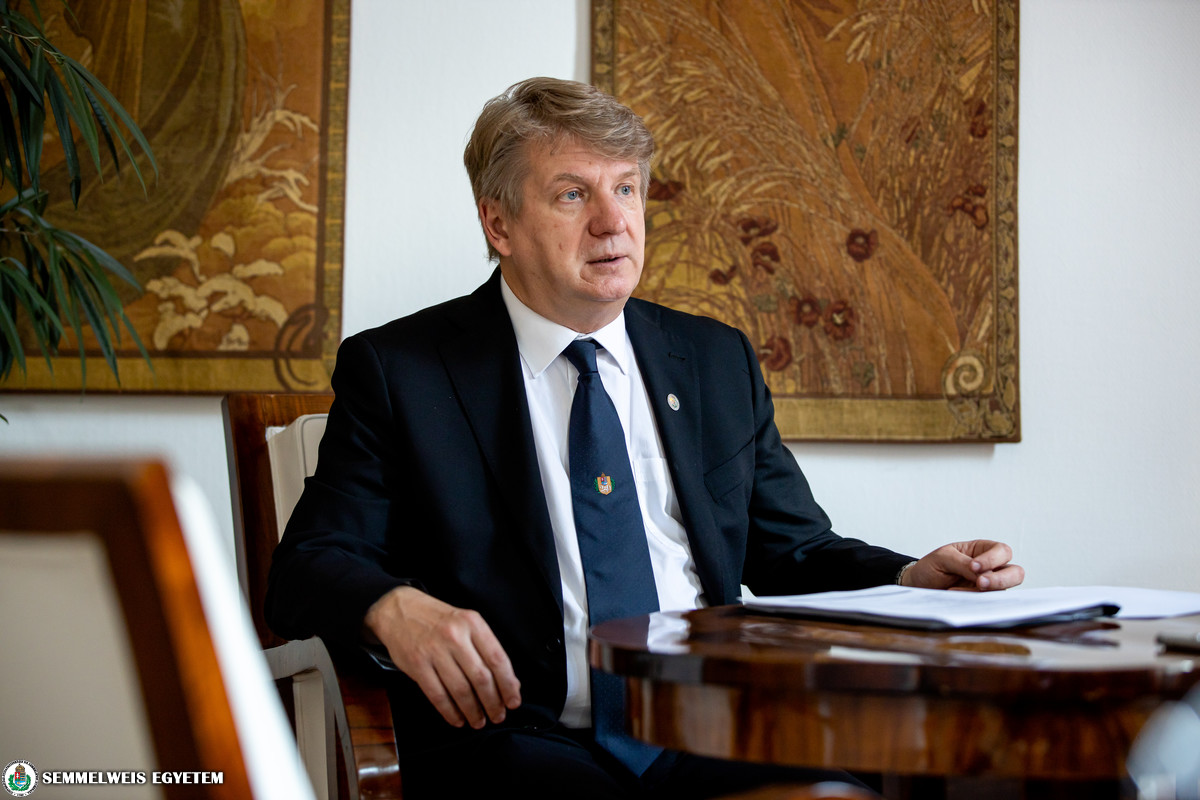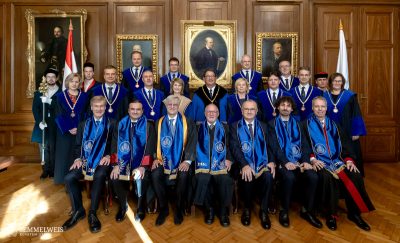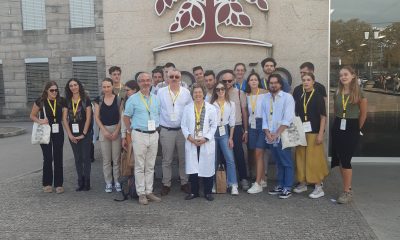Dr. Zoltán Zsolt Nagy, outgoing dean led the Faculty of Health Sciences for seven years. He said he was surprised by the complexity of the faculty’s activities and has learnt a lot from his colleagues. He highlighted the financial support received for the expansion of the building in Vas Street and the increase in scientific activities as his major results.
The Optometrist training was organized by the Department of Ophthalmology and this is how Dr. Zoltán Zsolt Nagy, professor became the member of the Faculty Council, then head of the Department of Clinical Studies and then dean, elected on 1st July 2013.
“I did not expect it to be such a complex task to lead the faculty. This complexity is mainly due to the varied programmes offered by the faculty: there are nearly 3,500 students, four Bachelor’s and four Master’s programmes in 11 specializations full-time and part-time as well.”, the outgoing dean said.
The Faculty of Health Sciences is the second largest faculty of Semmelweis University and offers the broadest training choices covering the entire field of health sciences. In addition, trainings in different areas of healthcare are held. Last year, nearly 2,000 professionals participated in trainings organized and held by the faculty.
“A few years ago health teacher training was launched, which had been unavailable for nearly a decade in Hungary. This is why more and more applications are handed in. We also introduced a new course on voice-, speech- and swallow therapy used in the rehabilitation of stroke patients. Last year our Physiotherapy programme was accredited by the International Association of Physical Therapists for 5 years, which is a great professional achievement.”, said Dr. Zoltán Zsolt Nagy.
The development of scientific activities has been a priority area and will continue to be so in the future. Currently, there are mainly lecturers working at the faculty and there are only a few researcher positions, therefore further developments are necessary in this area. In addition, the establishment of a research lab is planned.
“In the past few years, together with Gabriella Dörnyei Bednárikné, Deputy Dean and my successor as Dean, we have created a scientific portfolio, which has already brought results. In 2016 there were 35 topics researched at the faculty and in this academic year there were already 58. The growth of the number of research topics has also increased the inclination towards research and the quality of the students’ scientific papers has improved as well.”, the outgoing Dean pointed out.
The number of publications, especially those written in English, has increased significantly: 264 English articles have been published and a total of 970 publications have been published in the past 4 years.
“Developing our research base and increasing our academic performance have been of high priority. To support these endeavours, we founded Development in Health Sciences (DHS), our professional journal with a full-fledged editorial board and professional reviewers to provide publication opportunity for students and faculty.”, said Dr. Zoltán Zsolt Nagy.
Currently, the faculty journal is available in print and online in an open access format. Hopefully, it will be included in Medline’s reference system over time and in the long run it may also receive an impact factor.
To further support scientific development, the organization of the Doctoral School of Health Sciences began 3 years ago, which will start its first course in the academic year 2020/2021 within the university’s School of PhD Studies. The four large programmes, Clinical and Comparative Health Sciences; Theoretical and Preclinical Health Sciences; Society and Health; Public Health Sciences will include narrower areas that will hopefully further develop the faculty’s academic activities and recognition.
The Faculty of Health Sciences moved to the building of a former hospital in 2000. Dr. Zoltán Zsolt Nagy considers the third phase of the renovations as one of his greatest achievements: with government support, the university has received 5.8 billion forints to finance the construction of a new building of the faculty. The building will accommodate two large lecture halls, seminar rooms, labs and a separate floor will house the Traditional Chinese Medicine course currently held at various locations. Increasing the number of staff rooms may help increase the number of teachers because a lot of external teachers are involved in education due to the lack of space. The new building is planned to be opened at the end of 2021.
There are about 25 cooperative partners within Hungary which provides a wider range of opportunities in practical training and there are nearly 40 international cooperative partners mainly within the framework of the Erasmus+ programme. One of the most important international relations is with the University of Lugano, where Physiotherapy education is carried out according to the faculty’s programme. The faculty has been cooperating with Heilongjiang University of Chinese Medicine and Shanghai University of Traditional Medicine for several years in the field of Traditional Chinese Medicine. Together with universities in the USA the faculty has recently won a million dollars for the development of Nursing education.
“I am convinced that I can hand over the faculty in a stable state in all respects, as a lot of development and modernization have been achieved both in the fields of education and research. The faculty’s academic performance has improved, the teaching staff and the quality of education is very good, thanks to our colleagues. We have achieved significant results together in the past seven years. I am convinced that the new dean will maintain the faculty’s quality and will further improve it.”, said Dr. Zoltán Zsolt Nagy.
Eszter Keresztes
Photo: Attila Kovács – Semmelweis University
Translation: Ágnes Raubinek


